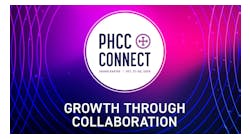Latest from Industry Event News
Sponsored
Comfortech preview:Service management & conflict resolution
While we would all agree that the best conflict resolution strategy is not to get there in the first place, experience has taught us otherwise. Misunderstandings can arise among both internal customers, those with whom you work, and external customers, those who pay for the products and services you deliver. Both internal and external customer situations can result in conflict and tense relationships.
We all seek success in our life, both personally and professionally. And successful people are not without problems, they are people who have learned to solve problems and conflicts. Everyone, regardless of their background, education and life experiences encounters conflicts. The difference is in whether a manager knows how to be constructive when resolving them.
Workplace conflict is defined as two or more people having opposing views on the same issue.
Here is an example about how managers can recognize potential and then discern between positions and interests. Let’s say that two of your employees are applying for a job promotion and both employees insist that they are the better candidate. Their argument is their position. But their interests might be different as you, the manager, begin to ask questions.
After investing a brief amount of time with each employee, you learn that one employee might want the promotion because of the salary increase — this is this employee’s underlying interest. The other employee might want the promotion to broaden his operational knowledge. In this case, the operational knowledge is the underlying interest.
Assuming both employees are competent, an insightful manager might be able to give the promotion to the employee who wants the salary increase, while increasing the operational responsibilities of the other employee. This way the manager can satisfy both employees, even though only one promotion was available.
This example possesses the required proactive behaviors, which can help to avert a conflict. These behaviors include: awareness, inquiry, listening and discernment. These four behaviors can be applied externally, similar to the manager in the previous example. His awareness of potential conflict led to a constructive inquiry at which time each employee felt safe about revealing their underlying interests.
The safe environment, that enabled both employees to speak openly and honestly, is the beginning of how good managers seek to resolve conflict. In every aspect of business, facts must emerge supreme and the best managers understand how to create an environment that maximizes facts and minimizes opinion or hearsay.
Peter Drucker, the renowned management expert and author, asked managers a critical question. He asked, “Should managers do things right or should managers do the right things?” The answer to this question lies in Drucker’s simple, yet profound explanation: “Management is doing things right; leadership is doing the right things.”
So we can learn from Drucker’s answer that “doing things right” involves management expertise and that “doing the right things” requires relationship savvy. The culmination of knowledge and relationship are critical factors in effective conflict resolution.
The previous example further clarifies that it was awareness that resulted in the knowledge, so he could discern how to resolve potential conflict. So we saw that both awareness and discernment are behaviors that help managers to “do things right.”
We also saw that it was inquiry, which includes the proper way to ask questions, and listening that necessitated the manager’s relationship skills, which enabled him to “do the right things.” These four important management behaviors enable managers to maintain perspective and see the bigger picture towards conflict resolution.
Steve Coscia will be presenting a session about High Octane Service Management at Comfortech 2016. Don’t delay — register for Comfortech today!
Steve Coscia | President
Steve Coscia is one of the most widely published and quoted authorities in trade publications on the topics of customer service and soft skills. An avid researcher of customer service trends, Coscia conducted one of the industry’s first studies of stress in the customer service environment. His Soft Skills Curriculum is taught worldwide at colleges and career centers. Trade Associations such as ACCA, PHCC, SMACNA, AMCO and NPGA host Coscia’s speeches and seminars as a benefit to their members.



